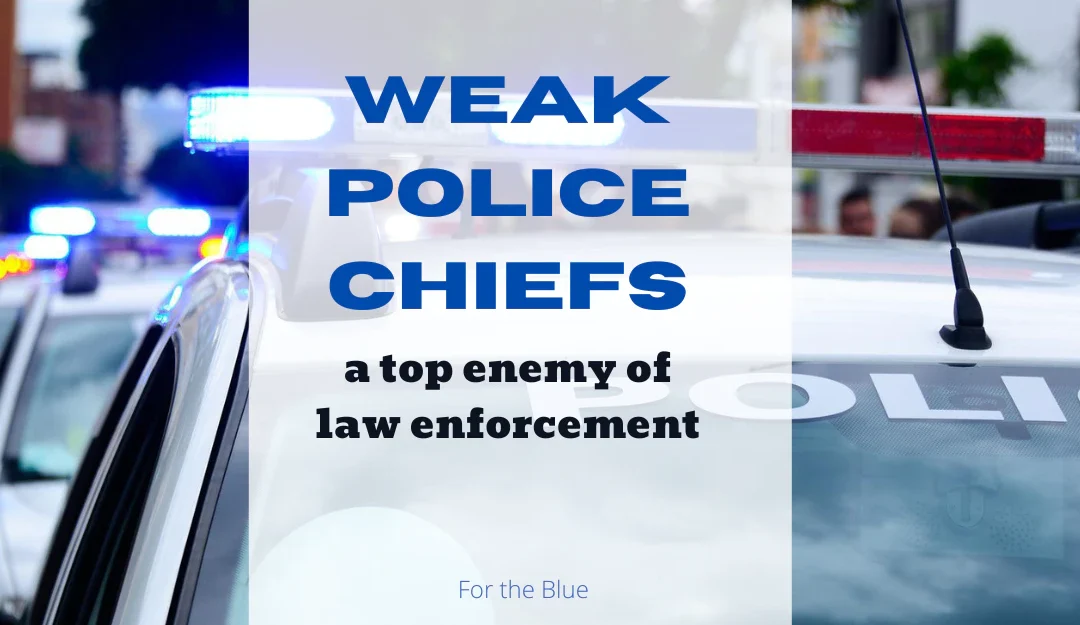Police chiefs influence everything from officer performance and morale, to public perception of, and confidence in the departments they lead. Based on feedback I’ve received over the past few years, weak police leadership is a widespread issue that’s having detrimental effects on policing and public safety.
In business environments where office politics are a dominant factor, it’s not uncommon to see mediocre (and even inept!) employees get promoted to managerial positions. If you’ve worked in a soul-sucking place like this, you know how it can lead to feelings of resentment, mistrust, fakeness, and other toxic dynamics that deeply impact employee performance and morale.
The Stakes are Much Higher in Policing
Put yourself in the position of a cop whose chief has a penchant for placing politics and public perception before due process and officer well-being. If you’re not certain your department’s leadership would have your back in a justified officer-involved incident, for example, how could you be effective?
Wouldn’t you think twice before exposing yourself to situations that aren’t immediate? Or maybe even hesitate to use necessary force to subdue a perpetrator? When pervading dynamics in a police department are doubt and fear, cops will inevitably become less effective – and as a result, we the citizenry will be less safe.
Good police chiefs set the tone for the department, thus ensuring that cops are able to perform optimally. Without solid leadership, cops flounder and the department becomes a toxic place to work.
Since weak police leadership is such a critical issue, I’m dedicating several issues to the topic. In fact, I already have several interviews lined up for future issues. If you’re a rank-and-file-police officer, police chief, command officer, elected official, or anyone who has thoughts on this topic and would like to be interviewed, I’d love to speak with you. We can chat via phone, Zoom, or depending on where you live, meet in person. We can also work via email if you prefer. And of course, we can keep it confidential at your request. You can reach me at fortheblue@substack.com
For this first interview, I asked Major Travis Yates, author of The Courageous Police Leader, for his insights. Our interview is presented in Q & A format.
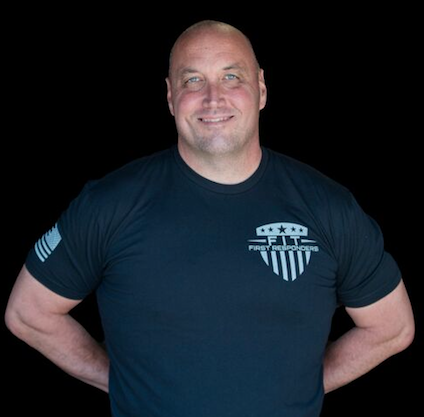
About Major Travis Yates
Travis began his law enforcement career in 1993, during which time he’s worked in a number of positions, including patrol, gangs, training, and special operations; he’s currently full-time commander.
Travis is also director of training for Law Officer, has written hundreds of articles for various publications, and has been interviewed by major media outlets. He founded Cops & Cleats, an initiative that provides shoes to underprivileged children; and he helped found the Police Athletic League.
You can learn more about Travis and his book on his website.
Question: You said in your book that cowardly leadership is policing’s number one enemy. Can you please elaborate on this?
Traditionally, the enemies of law enforcement have always been there. Whether it’s the media lying or activists like Al Sharpton doing the same, the profession has always dealt with it. Social media is certainly an “x-factor” that makes all of that louder, but those enemies are nothing new.
What is new is how our leaders have dealt with. Anyone that took this job knew that the noise these enemies made were part of the job, but we always knew that as long as we did what was right, within policy, and the law, they could be as loud and obnoxious as they wanted because we were supported.
In many agencies, that support and thus that leadership is absent and that is the root of every internal problem America is seeing with law enforcement today. We don’t politicians “defunding” police as long as cowards are running our organizations…we will defund ourselves.
Question: What impact do cowardly police leaders have on officer morale (including recruitment and retention) and their ability to effectively police?
Cowardly leaders are the cause, and they are the entire impact. What is hilarious is that these cowards are trying to fix the recruitment and retention problem with money. They are so narcissistic to actually believe that they don’t have anything to do with it and the lack of interest in the job is somehow financial. It is ludicrous and hilarious because every cop working today with 10 or 20 years on started with the lowest pay in their community, but they did the job because it was a calling to serve. But that only goes so far.
You cannot make the job impossible and expect anyone to do it. To understand the recruitment and retention problem, you have to understand what drives employees and in particular, the personalities that wear the uniform.
Every cop I hear from isn’t leaving because of money or the media or activists. They are leaving because there isn’t any leadership. This is proven by the agencies that don’t have those issues. If recruitment and retention was global from some nefarious issue out of our control, everyone would be experiencing it and they clearly are not. There are still good law enforcement leaders that are running great agencies and I thank God for it.
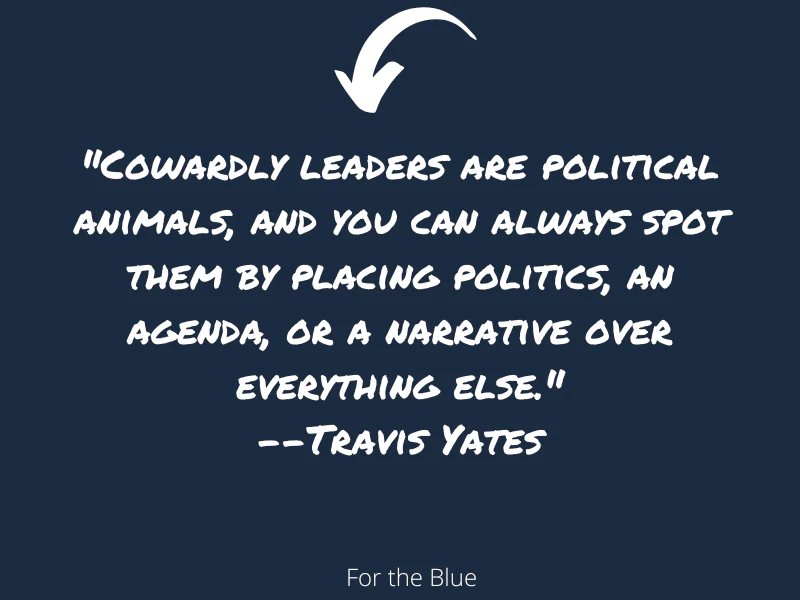
Question: In your book, you list and explain 10 characteristics of cowardly police leaders. Are any of these characteristics more harmful to policing or are they equally harmful?
Well, the top 10 list is interesting because I wrote them based on my personal experience and what I had been hearing from law enforcement across the country in the 20 years I had been teaching on the road so they are very much generic but I have cops come up to me all the time and they think I was writing specifically about their chief or sheriff as if I knew them.
While they are all very destructive, I think any leader that seeks to “always serve themselves” will take an agency, community, and their personnel down a very dark place rather quickly. I call it the “art of self-preservation” in my seminar, and it is when leaders will do whatever it takes to get ahead and that has left carnage across our law enforcement agencies in the form of good men and women behind the badge that lost their jobs, reputation and much more simply because they worked for a coward that sacrificed them over the truth.
Question: How can the public easily spot a weak police leader? Are there any tell-tale signs?
Cowardly leaders are political animals, and you can always spot them by placing politics, an agenda, or a narrative over everything else. It’s why so many agencies banned “no knock” warrants after the Breonna Taylor tragedy. The officers knocked, they announced, and they were shot at by a suspect using Taylor as a shield. It’s tragic but she didn’t die because a judge signed a “no knock” warrant that the officers did not execute. Rather than tell the truth, leaders across the country just bent over for politics or for a narrative that happened to be a lie.
There are hundreds of these examples. Considering there are about 1000 stories on police leaders taking down a thin blue line emblem shows you just how bad of a shape our leadership is.
To those cowards, I would ask them this. Did going along with the narrative or changing a policy because it “was demanded” help? Did it improve crime? Did the loud mouths suddenly stop screaming? Did it improve law enforcement operations? Everyone with two brain cells knows the answer and it drives me crazy what these cowards are doing to a great, great profession.
Question: How prevalent is cowardly police leadership in the U.S.?
We have to remember that there are over 18,000 law enforcement agencies and there are a lot of great leaders but when you talk about the major cities, it is very prevalent and that is because those cities are very political, and chiefs are selected based on those politics. Politics has no place in a profession that has one job….stopping crime.
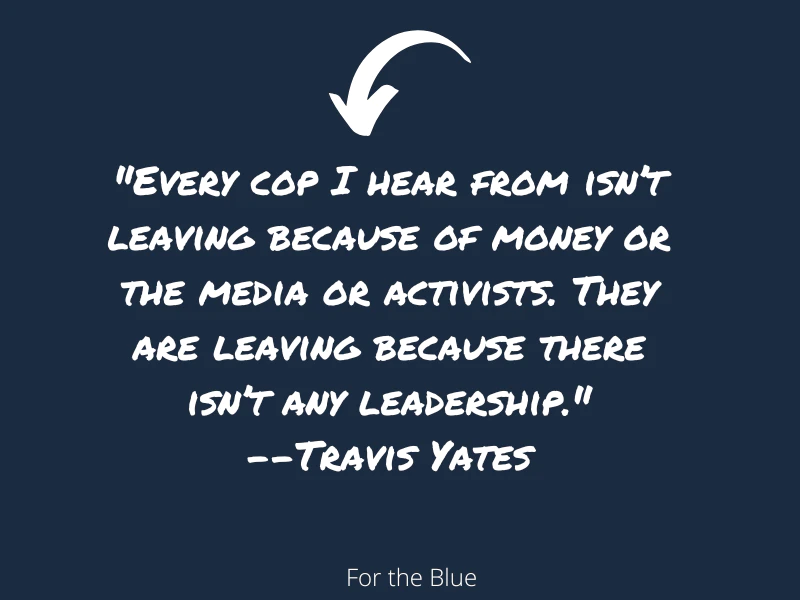
Question: Why do you think weak leaders are being hired instead of hiring courageous leaders? What’s behind it?
For one, the politicians are hiring police chiefs and too often they don’t hire someone with proven leadership skills to navigate the profession with the goal of providing a safer community. They hire someone that they align with politically and that is a huge problem. A huge sign this is happening is just listen to the words of a police leader or politician.
Do they talk about reducing crime and making the streets safer for their citizens or do they say things like “we must build trust?” Trust is great but you know a way to build trust is to police an environment where kids are safe to play outside. We aren’t seeing that, rather we are seeing some vague metric, that no one has defined, as the measurement for success and it is silly. It doesn’t matter what pony we ride up in, there will always some that will never trust law enforcement and frankly, most of them are criminals so it would be weird for them to trust us.
American policing has the goal of crime reduction and that’s it. Of course, we should be professional, and we should utilize best practices and we should never accept mediocrity but at the end of the day, we need leaders that are mission focused on making our communities safer.
Do you think this trajectory will change in the future?
I certainly hope so but it’s as bad as I’ve seen it now and I don’t see much movement, so I am not overly optimistic. What I believe will occur is that agencies, ran by cowards, will go bankrupt, meaning slowly their agencies will be a shell of what once was, and a major shift will have to occur. I see that shift in county law enforcement. Sheriffs are the last bastion of Courageous Leaders.
Oddly, they are political but they don’t answer to a politician….They answer to the people. And people, no matter their race, ethnicity or where they are from are solidified on one front….they want to be safe. So I see Sheriff’s Departments taking over where local agencies go under from bad leaders. Of course, it will be sold as an “economic” decision but it will be a decision forced upon them from their own doing.
Can you think of any retired or current police chiefs who exemplify what it means to be a courageous police leader? Please elaborate on why this is.
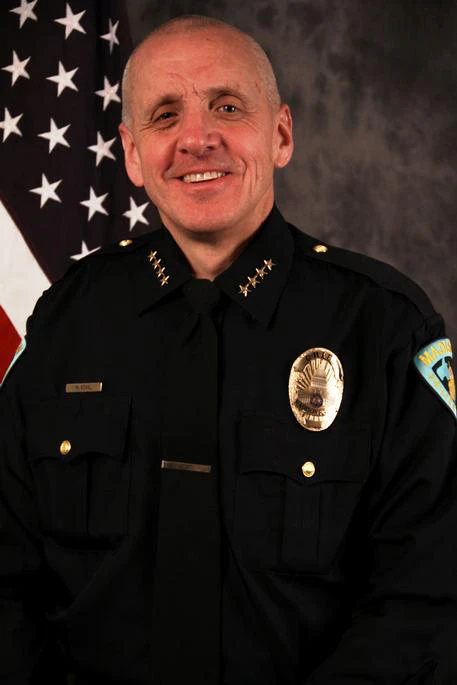
Retired Chief Mike Koval, Madison Police Department (Wisconsin), is the epitome of a real leader. In fact, he’s the one who inspired Steve & me to advocate for law enforcement. That’s what a real leader does: Inspires. You’ll be learning more about him in subsequent issues.
Frankly, most are retired either voluntary or unvoluntary because when courageous leaders stand up, they are attacked mightily.
I respect former Madison Police Chief Mike Koval tremendously because he refused to simply give in to demands because they were demands. No agency is perfect, but he had a true vision to make it great. This sounds crazy but I have seen this time and time again. A great police department is like kryptonite to cop haters. The last thing the cowards want, is for that agency to succeed. That’s why Live PD was attacked and when Mike starts making traction on doing some very good things for the agency and community, they had to go after him.
Former Milwaukee Police Chief Ed Flynn and I probably wouldn’t agree on politics, but I saw him go after the media and the liars on multiple occasions. He worked in one of the most politically charged environments out there and I saw him stand up multiple times and defend his officers. Granted, it got him an early retirement but that’s what being courageous is all about. It’s not easy but it is worth it.
I would be remiss to not mention the 2020 and 2021 winner of the “Courageous Police Leader of the Year Award.” I am honored that Law Officer sponsors this award, based on my book, and I would suggest that if anyone works for a Courageous Leader, to submit them for the annual award.
I had the privilege to personally hand Wauwatosa (WI) Police Chief Barry Weber and Eureka County (NV) Sheriff Jesse Watts the award the last two years and I’m looking forward to announcing the 2022 winner very soon.
Do you have any other thoughts on this issue?
First, Paula, I think that what you are doing is exactly how we can bring safety back to our great country. It is citizens and advocates like yourself that law enforcement needs. Ultimately, we work for the citizens, and we need the honest, hardworking citizens to come together and demand safety. I firmly believe that everything bad that happens is because of leadership while everything good that happens is because of leadership.
Today, more than ever, we need great leaders to stand up for what is right and that means citizens everywhere.
This interview originally appeared on For The Blue.

